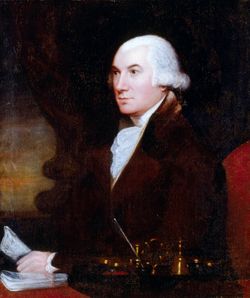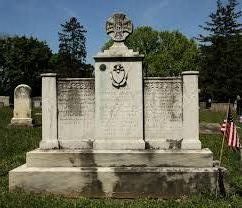Joshua remains best known as the father of Louisa Catherine Johnson, his second daughter, who married (then future) President John Quincy Adams in 1797. Joshua and his wife, Catherine Young Newth, had nine offspring, eight daughters and one son.
Joshua was born on the "Brewhouse" property of his father on St. Leonard Creek in Calvert County MD. By 1767 Joshua, age twenty-three, had already established himself as a merchant in Annapolis, MD. In Apr 1771, Johnson entered into a partnership agreement with two former competitors, Charles Wallace and John Davidson to establish the London office of the Annapolis firm of Wallace, Davidson, and Johnson, the first American firm to trade independently of British middlemen. Joshua arrived in England in May of that year as the firm's London representative. He later entered into another partnership, becoming Wallace, Johnson, and Muir, which played an important role in expanding the tobacco trade with France, marketing French goods in the United States as well as importing crucial materials to support the fledgling nation in the years of the Revolutionary War. From 1778 to 1783, during the revolution, the Johnson family lived in Nantes, France, following which they returned to London where Joshua resumed his business there, and was later appointed by President Washington as the first U.S. Consul to London (1790–1797).
Louisa Johnson and John Quincy Adams became engaged in 1796 when John was the U.S. Minister to the Netherlands, and was in London for the ratification of Jay's Treaty. They were married in that city on 26 July 1797, in the Johnson family's Anglican parish church of All Hallows Barking near their home on Cooper's Row, just north of the Tower of London.
From all records available, Joshua generated enormous profits for his partners over the years, and made, and lost, a fortune himself, his business in financial ruin by 1797.
In Sep of 1797 Joshua and his family departed Gravesend and returned to the United States, Joshua then establishing a residence in Georgetown in Washington. President John Adams appointed Johnson Superintendent of Stamps on 5 May 1800, in part as a "reward" for his services to the nation, a position Johnson held until near his death in 1802.
Per John Quincy Adams' diary entries, on 3 Oct 1801, Joshua departed Georgetown with several family members for Fredericktown to visit his Johnson family there, and was stricken with a serious fever on the way. Upon arrival in Fredericktown, he was moved into the home of his brother, Baker Johnson, and remained there until his death on 17 Apr 1802. Another brother, Dr. John Johnson, is assumed to have participated in his care. His obituary, as published in Fredericktown, is attached below.
He was first interred in the "Johnson crypt" in the All Saint's Church burying ground within the city of Fredericktown, but reinterred to Mt. Olivet in 1913 along with others of the Johnson family. Per the cemetery, his remains were placed in a second vault with other Johnsons beneath the monument for his brother, Gov. Thomas Johnson and his name not inscribed. The cemetery records are now the only evidence for his reinternment there.
Upon his wife, Catherine's, death in 1811, for reasons unknown, she was not interred with Joshua, but rather with her eldest daughter, Nancy, and four Hellen grandchildren, in the Hellen plot in Rock Creek Cemetery in Washington.
Obituary:
Wednesday, April 21, 1802
Paper: Political Intelligencer (Fredericktown, MD) Volume: IX, Issue: 92, Page: 3
DEPARTED THIS LIFE on Saturday evening last in this town after a long and painful illness, JOSHUA JOHNSON, Esq. for many years a respectable Merchant in London and lately superintendent of Stamps in the City of Washington.
On Monday evening his remains were respectfully deposited in the silent tomb in the Episcopal burial ground attended by numerous relatives and friends.
In early life Mr Johnson embarked in commercial pursuits, went over to London prior to the American Revolution, where he established a commercial connexion, long and well known for its extensive dealings and credit. His attachment to the liberties of his native country and his decided opposition to the oppressive measures of the then British Government, induced him to relinquish his favorite pursuits for a few years and to retire with his family to France. At the conclusion of the War he returned again to London, resumed his former profession, which he continued to pursue until a few years ago, when a disposition to retired induced him to return to his native Country, there to spend the evening of his days.
His attention to his countrymen, in prosperity or in adversity both in London and in France was great and unremitted. His house was a hospitable asylum to the Americans and particularly to those from his native state.
His country sensible of his services and sacrifices during the American war conferred on him the honorable appointment of Consul at the Port of London, and on his return to Maryland he was appointed to superintend one of the revenue departments of the government.
He was an affectionate husband, an indulgent parent, and a useful citizen. By his death his family hath sustained an irreparable loss and society a valuable member.
Joshua remains best known as the father of Louisa Catherine Johnson, his second daughter, who married (then future) President John Quincy Adams in 1797. Joshua and his wife, Catherine Young Newth, had nine offspring, eight daughters and one son.
Joshua was born on the "Brewhouse" property of his father on St. Leonard Creek in Calvert County MD. By 1767 Joshua, age twenty-three, had already established himself as a merchant in Annapolis, MD. In Apr 1771, Johnson entered into a partnership agreement with two former competitors, Charles Wallace and John Davidson to establish the London office of the Annapolis firm of Wallace, Davidson, and Johnson, the first American firm to trade independently of British middlemen. Joshua arrived in England in May of that year as the firm's London representative. He later entered into another partnership, becoming Wallace, Johnson, and Muir, which played an important role in expanding the tobacco trade with France, marketing French goods in the United States as well as importing crucial materials to support the fledgling nation in the years of the Revolutionary War. From 1778 to 1783, during the revolution, the Johnson family lived in Nantes, France, following which they returned to London where Joshua resumed his business there, and was later appointed by President Washington as the first U.S. Consul to London (1790–1797).
Louisa Johnson and John Quincy Adams became engaged in 1796 when John was the U.S. Minister to the Netherlands, and was in London for the ratification of Jay's Treaty. They were married in that city on 26 July 1797, in the Johnson family's Anglican parish church of All Hallows Barking near their home on Cooper's Row, just north of the Tower of London.
From all records available, Joshua generated enormous profits for his partners over the years, and made, and lost, a fortune himself, his business in financial ruin by 1797.
In Sep of 1797 Joshua and his family departed Gravesend and returned to the United States, Joshua then establishing a residence in Georgetown in Washington. President John Adams appointed Johnson Superintendent of Stamps on 5 May 1800, in part as a "reward" for his services to the nation, a position Johnson held until near his death in 1802.
Per John Quincy Adams' diary entries, on 3 Oct 1801, Joshua departed Georgetown with several family members for Fredericktown to visit his Johnson family there, and was stricken with a serious fever on the way. Upon arrival in Fredericktown, he was moved into the home of his brother, Baker Johnson, and remained there until his death on 17 Apr 1802. Another brother, Dr. John Johnson, is assumed to have participated in his care. His obituary, as published in Fredericktown, is attached below.
He was first interred in the "Johnson crypt" in the All Saint's Church burying ground within the city of Fredericktown, but reinterred to Mt. Olivet in 1913 along with others of the Johnson family. Per the cemetery, his remains were placed in a second vault with other Johnsons beneath the monument for his brother, Gov. Thomas Johnson and his name not inscribed. The cemetery records are now the only evidence for his reinternment there.
Upon his wife, Catherine's, death in 1811, for reasons unknown, she was not interred with Joshua, but rather with her eldest daughter, Nancy, and four Hellen grandchildren, in the Hellen plot in Rock Creek Cemetery in Washington.
Obituary:
Wednesday, April 21, 1802
Paper: Political Intelligencer (Fredericktown, MD) Volume: IX, Issue: 92, Page: 3
DEPARTED THIS LIFE on Saturday evening last in this town after a long and painful illness, JOSHUA JOHNSON, Esq. for many years a respectable Merchant in London and lately superintendent of Stamps in the City of Washington.
On Monday evening his remains were respectfully deposited in the silent tomb in the Episcopal burial ground attended by numerous relatives and friends.
In early life Mr Johnson embarked in commercial pursuits, went over to London prior to the American Revolution, where he established a commercial connexion, long and well known for its extensive dealings and credit. His attachment to the liberties of his native country and his decided opposition to the oppressive measures of the then British Government, induced him to relinquish his favorite pursuits for a few years and to retire with his family to France. At the conclusion of the War he returned again to London, resumed his former profession, which he continued to pursue until a few years ago, when a disposition to retired induced him to return to his native Country, there to spend the evening of his days.
His attention to his countrymen, in prosperity or in adversity both in London and in France was great and unremitted. His house was a hospitable asylum to the Americans and particularly to those from his native state.
His country sensible of his services and sacrifices during the American war conferred on him the honorable appointment of Consul at the Port of London, and on his return to Maryland he was appointed to superintend one of the revenue departments of the government.
He was an affectionate husband, an indulgent parent, and a useful citizen. By his death his family hath sustained an irreparable loss and society a valuable member.
Gravesite Details
Reinternment from the "Episcopal Burying Ground" within the city of Frederick in 1913. His remains are in a separate vault beneath the memorial for his brother, Gov. Thomas Johnson, and there is no inscription for Joshua
Family Members
-
![]()
Ann "Nancy" Johnson Hellen
1773–1810
-
![]()
Louisa Catherine Johnson Adams
1775–1852
-
![]()
Carolina Virginia Marylanda Johnson Frye
1776–1862
-
![]()
Mariane Johnson
1777–1778
-
![]()
Thomas Baker "Tom" Johnson
1779–1843
-
![]()
Harriet Johnson Boyd
1781–1850
-
![]()
Catharine Maria Frances "Kitty" Johnson Smith
1784–1869
-
![]()
Elizabeth Jennet Dorcas "Eliza" Johnson Pope
1786–1818
-
![]()
Adelaide Johnson Hellen
1788–1877
Advertisement
Explore more
Sponsored by Ancestry
Advertisement























